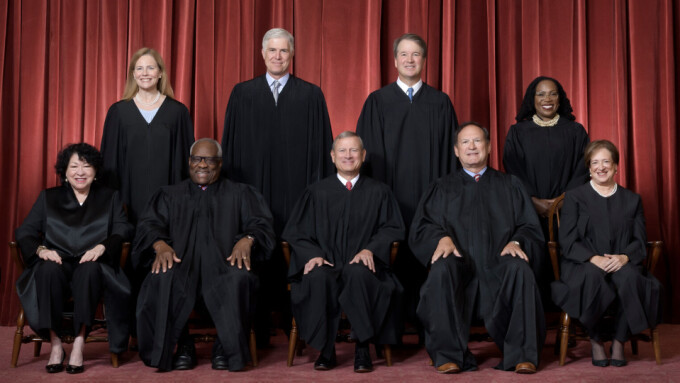WASHINGTON — The U.S. Supreme Court on Wednesday heard oral arguments in Free Speech Coalition v. Paxton, the case challenging Texas’ controversial age verification law, HB 1181.
HB 1181 was passed by the Texas legislature in May 2023 and is a much-augmented version of Louisiana’s age verification law and its many copycat versions in other states. At the time, FSC condemned the law as “blatantly unconstitutional” and a “violation of the First Amendment rights of creators, consumers and platforms.”
The issue before the court is what standard of review should apply to such a law, which aims to protect minors but in the process burdens adults’ access to protected speech. A lower court applied only the “rational basis” standard, whereas FSC, its fellow plaintiffs and free speech advocates maintain that the highest level of judicial review, “strict scrutiny,” must apply.
In a September 2024 statement, FSC argued, “Where a less-restrictive alternative exists — for example, the voluntary installation of filtering software on minors’ devices — the government cannot impose age verification on adults in the name of protecting children.”
According to court transcripts, Justice Sonia Sotomayor noted during oral arguments that the court has previously, on at least five occasions, applied the highest level of legal scrutiny when deciding similar cases.
“For us to apply anything else would be overturning at least five precedents,” she said.
Justice Elena Kagan cited “possible spillover dangers.”
“You relax strict scrutiny in one place and all of a sudden strict scrutiny gets relaxed in other places,” she said. “You treat a clearly content-based law as not requiring strict scrutiny and all of a sudden you start seeing more content-based restrictions that don’t have to satisfy strict scrutiny.”
The court’s conservative justices, by contrast, seemed to suggest that advances in technology have rendered past standards obsolete.
Conservative Justice Amy Coney Barrett cited the ease with which minors can access adult content online and questioned the efficacy of content filtering across various devices.
“I think that the explosion of addiction in — to online porn has shown that content filtering isn’t working,” she said.
Chief Justice John Roberts opined that “the nature of the pornography” has changed.
“Are those the sort of developments that suggest revisiting the standard of scrutiny as — as something that we should at least consider, as opposed to keeping a structure that was accepted and established in an entirely different era?” he asked.
Derek Shaffer of Quinn Emanuel Urquhart & Sullivan, who argued on behalf of FSC and the other plaintiffs, urged the court to follow precedent.
“The tradition on the internet is to say that it will be free and that it is incumbent upon parents to screen out content that is inappropriate for their kids,” he told the justices. “That's where the law should stay.”
Electronic Frontier Foundation Staff Attorney Lisa Femia, who attended the arguments in person, said in a statement, “Nothing in the argument today changed the fact that Texas' age-verification law places immense burdens on adults' First Amendment rights, and we urge the Supreme Court to overturn the Fifth Circuit's decision upholding the law.
“The Texas law robs adult internet users of anonymity, exposes them to serious privacy and security risks, and blocks some adults entirely from accessing sexual content that’s protected under the First Amendment,” she added. “Texas completely failed to appreciate the substantial privacy and security risks at issue, and continued to incorrectly suggest that online age verification – which requires millions of internet users to upload and submit identifying information – is no different than quick, one-on-one, in-person ID checks. Other courts have consistently held that similar online age verification laws are unconstitutional. To protect freedom of speech online, the Supreme Court should clearly reaffirm those correct decisions here.”
The court's decision is expected sometime over the next several months. The court could rule directly on the constitutionality of the Texas law, or it could send the case back to a lower court with instructions as to what level of scrutiny to apply.
Either way, the court’s eventual ruling in the case is expected to impact state age verification laws around the country and other litigation.
In July 2024, a Texas district judge granted a request by Pornhub parent company Aylo to pause proceedings in a lawsuit filed by Texas Attorney General Ken Paxton over Pornhub’s alleged failure to implement age verification requirements, pending the Supreme Court's ruling in FSC v. Paxton. In December, a U.S. district court judge paused a lawsuit over Indiana’s age verification law, and Florida’s attorney general asked a federal court to halt the FSC lawsuit challenging that state's AV law, until the court decides the Texas case.






